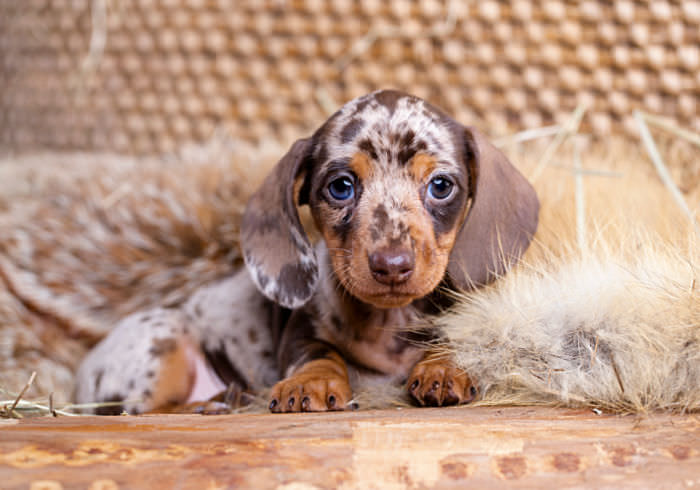To care for a new Dachshund puppy, provide them with a secure bed or box, away from drafts, where they can observe household activity. Ensure they have plenty of sleep and a friendly voice to reassure them.
Additionally, brush their teeth at least three times a week and leash walk them due to their high prey drive. Avoid activities that may harm their backs, as Dachshunds are prone to back problems. Training should be done in a distraction-free area, as they are easily distracted.
Be mindful of their food intake to prevent obesity. Bathing and grooming should be minimal, depending on their coat type.
Getting Started With Your New Dachshund Puppy
Bringing a new Dachshund puppy home is an exciting time, but it’s important to ensure that you have everything in place to provide a safe and comfortable environment for your new furry friend. In this section, we will discuss some essential steps you need to take to get started with your new Dachshund puppy.
Setting Up A Safe Environment
The safety of your Dachshund puppy should be your top priority. Dachshunds are small and curious dogs, so it’s crucial to create a safe environment for them to explore and play without any hazards. Here are some tips:
- Remove any toxic plants, chemicals, or small objects that could be ingested.
- Secure loose cords or cables that could be chewed on.
- Block off areas that are off-limits for your puppy.
- Install safety gates to prevent access to stairs or other dangerous areas.
Choosing The Right Bed
A comfortable bed is essential for your Dachshund puppy to rest and sleep peacefully. Here are some factors to consider when choosing the right bed:
- Look for a bed with adequate cushioning and support for your puppy’s growing body.
- Consider the size of the bed – it should be large enough for your puppy to stretch out comfortably.
- Opt for a washable bed to make cleaning easier.
- Place the bed in a quiet area where your puppy can feel safe and secure.
Establishing A Routine
Establishing a routine is crucial for your Dachshund puppy’s overall well-being and behavior. A consistent schedule provides structure and helps your puppy feel secure in their new environment. Here are some elements to include in your puppy’s routine:
- Set regular times for feeding to regulate their digestion.
- Schedule bathroom breaks to help with potty training.
- Incorporate playtime and exercise to keep your Dachshund puppy active and engaged.
- Include periods of calm and relaxation to prevent overstimulation.
By setting up a safe environment, choosing the right bed, and establishing a routine, you are laying the foundation for a happy and healthy life with your new Dachshund puppy. Remember to give your puppy plenty of love, patience, and positive reinforcement as you embark on this incredible journey together.
Feeding And Nutrition
Feeding and nutrition are vital aspects of caring for your new dachshund puppy. Providing the right food, following a feeding schedule, and monitoring your puppy’s weight are essential for their overall health and well-being. Let’s delve deeper into each aspect:
Selecting The Right Food
Choosing the right food for your dachshund puppy is crucial as it directly impacts their growth and development. Look for high-quality puppy food specifically formulated for small breeds. Opt for a balanced diet that provides the right balance of protein, carbohydrates, and fat.
When selecting food, it’s important to consider your puppy’s age, size, and any specific dietary needs they may have. Consult your veterinarian for recommendations and avoid foods that contain artificial additives, preservatives, or fillers, as they offer little to no nutritional value.
Feeding Schedule
Establishing a consistent feeding schedule is vital for your dachshund puppy’s health and behavior. Feed your puppy at the same times each day to help maintain their digestive system and establish a routine. Dividing their daily food intake into two or three meals is ideal to prevent overeating and promote proper digestion.
Avoid free-feeding, where food is left out all day, as it can lead to overeating and weight gain. Measure your puppy’s food accurately according to the feeding guidelines provided on the packaging. Monitor their appetite and adjust portions as necessary to maintain a healthy weight.
Monitoring Your Puppy’s Weight
Keeping an eye on your dachshund puppy’s weight is crucial to ensure they are growing at a healthy rate. Rapid weight gain can be detrimental to their bone and joint development, while excessive weight loss may indicate a health issue or improper nutrition.
Weigh your puppy regularly using a scale designed for small animals. If you notice any significant changes in their weight, consult your veterinarian for guidance. Your vet can provide specific recommendations regarding portion sizes and dietary adjustments to keep your puppy at an optimal weight.
In summary, choosing the right food, establishing a feeding schedule, and monitoring your dachshund puppy’s weight are key components of their overall care. By providing a nutritious diet, adhering to a consistent feeding routine, and ensuring they maintain a healthy weight, you’ll be setting your dachshund puppy up for a long and happy life. Remember to consult your veterinarian for personalized advice and guidance based on your puppy’s specific needs.Healthcare And Grooming
To care for a new Dachshund puppy, brush their teeth regularly and provide leash walks for exercise. Create a secure, cozy space for them to sleep, away from drafts, and make sure they have plenty of sleep. Training in a distraction-free area is recommended.
Regular Vet Check-ups
Regular vet check-ups are essential for ensuring your Dachshund puppy’s overall health and well-being. By scheduling regular visits to the vet, you can catch any potential health issues early on and address them proactively. Your vet will perform a thorough examination, checking for any signs of illness or discomfort.
Vaccinations And Preventive Care
Vaccinations play a crucial role in protecting your Dachshund puppy against various diseases and infections. Your vet will create a customized vaccination schedule based on your puppy’s age and local disease prevalence. It’s important to stay up-to-date with these vaccinations to ensure your puppy’s immune system is strong.
In addition to vaccinations, your vet may recommend preventive care measures such as flea and tick prevention, heartworm medication, and deworming. These measures help keep your puppy safe from parasites and diseases that can be harmful to their health.
Dental Care
Proper dental care is essential for your Dachshund puppy’s oral hygiene. Dachshunds are prone to dental issues like dental plaque, tartar buildup, and gum disease, so regular brushing is crucial. It’s recommended to brush your puppy’s teeth at least three times a week using a dog-friendly toothbrush and toothpaste. This helps prevent dental problems and keeps their breath fresh.
Coat And Nail Care
Coat care is important to maintain your Dachshund puppy’s healthy and shiny coat. Regular brushing helps remove loose hair, prevents matting, and stimulates the skin. You may also want to consider professional grooming to keep their coat well-maintained.
In addition to coat care, nail care is crucial for your puppy’s comfort and mobility. Regular nail trimming prevents overgrowth, which can cause pain and difficulty walking. Make sure to use proper dog nail clippers and be cautious not to cut the quick, which is the sensitive part of the nail.

Credit: www.pinterest.com
Training And Socialization
Training and socialization are crucial aspects of raising a healthy and well-behaved Dachshund puppy. Proper training helps your puppy understand boundaries, develop good habits, and become a well-adjusted member of your family. Socialization allows your puppy to build confidence, learn to interact with other dogs and people, and adapt to various environments. In this section, we will cover basic commands and house training, leash training and exercise, and socializing with other dogs and people.
Basic Commands And House Training
Teaching your Dachshund puppy basic commands is essential for effective communication and establishing your role as the leader. Start with simple commands such as “sit,” “stay,” and “come,” and gradually progress to more complex commands like “lie down” and “heel.” Use positive reinforcement techniques like treats and praise to reward your puppy’s good behavior and consistency. Consistency is key when house training your Dachshund puppy. Establish a routine for bathroom breaks and create a designated potty area outside. Always supervise your puppy indoors and immediately take them outside when they show signs of needing to go.
Leash Training And Exercise
Leash training is essential for the safety of your Dachshund puppy and for enjoyable walks together. Start by introducing your puppy to a comfortable and properly fitted harness or collar. Allow them to get used to wearing it before attaching the leash. Begin leash training in a quiet and familiar environment, gradually increasing the difficulty by exploring different areas with more distractions. Use positive reinforcement and praise when your puppy walks calmly by your side. Regular exercise is important for your Dachshund’s overall health and energy levels. Daily walks and playtime sessions not only provide physical stimulation but also mental stimulation.
Socializing With Other Dogs And People
Socialization is vital for the development of your Dachshund puppy’s social skills and behavior. Introduce your puppy to different types of dogs, varying in size, age, and temperament. Arrange controlled playdates to allow your puppy to interact and learn appropriate play behaviors. Similarly, expose your puppy to various people, including children, adults, and strangers. Encourage positive experiences with treats and rewards, ensuring that interactions are always supervised and safe. Gradually increase the level of socialization by introducing your puppy to new environments, sights, and sounds.
Common Mistakes To Avoid
When caring for a new Dachshund puppy, it’s important to avoid common mistakes. Proper training and exercise are essential, and be mindful of their delicate backs and dental health. Creating a secure and comforting environment will help them feel safe and happy.
When bringing home a new dachshund puppy, it’s important to be aware of common mistakes that many owners make. Avoiding these mistakes will ensure that your dachshund grows up healthy and happy. Here are some key areas to exercise caution:
Exercise Caution With Jumping
Dachshunds have long bodies and short legs, which puts them at risk for back problems. One common mistake owners make is allowing their dachshund to jump on and off furniture or even jump high in the air. This can put strain on their backs and lead to serious injuries. It’s crucial to discourage jumping and instead provide ramps or stairs to assist your dachshund in getting on and off furniture safely.
Avoid Overfeeding
Due to their small size, dachshunds are prone to weight gain and obesity. Overfeeding is a common mistake that can result in serious health issues. It’s important to monitor your dachshund’s portion sizes and strictly follow feeding guidelines provided by your veterinarian. Avoid giving in to their pleading eyes and stick to a balanced diet to maintain their weight within a healthy range.
Not Providing Enough Mental Stimulation
Dachshunds are intelligent and curious dogs that require mental stimulation to thrive. Neglecting mental stimulation can lead to boredom and destructive behaviors. Engage your dachshund in interactive play sessions, provide puzzle toys, and teach them new tricks to keep their minds active and prevent behavioral problems.
Neglecting Dental Hygiene
Dachshunds are prone to dental issues, including gum disease and tooth decay. Neglecting their dental hygiene is a common mistake that can lead to pain and discomfort for your dachshund. Make a habit of brushing your dachshund’s teeth regularly, ideally at least three times a week, using dog-friendly toothpaste. Additionally, provide dental chews or treats that promote oral health to keep their teeth clean and prevent dental problems.
Avoiding these common mistakes will help you provide the best care for your new dachshund puppy. By exercising caution with jumping, avoiding overfeeding, providing enough mental stimulation, and maintaining good dental hygiene, you can ensure that your dachshund grows up to be a healthy and happy companion.

Credit: youdidwhatwithyourweiner.com

Credit: www.rover.com
Frequently Asked Questions On How To Care For A New Dachshund Puppy
What Not To Do With Dachshund Puppy?
To care for a Dachshund puppy, do not let them jump to avoid back injury. Brush their teeth regularly and provide leash walks with a sturdy fence. Place their bed in a secure spot, away from drafts, with a view of the household.
Train in a distraction-free area and be mindful of their food intake.
How Do You Take Care Of A Dachshund Puppy?
To take care of a Dachshund puppy, brush their teeth 3 times a week, provide regular exercise on a leash, and ensure a sturdy fence for their safety. Place their bed in a secure location away from draughts, and talk to them in a friendly voice to reassure and comfort them.
Keep training sessions in a distraction-free area and be mindful of their sensitive nose and food drive.
What To Do With A New Dachshund Puppy?
To care for a new Dachshund puppy: talk to them, provide a secure bed, keep them away from drafts, and ensure they get plenty of sleep. Establish boundaries and train them in areas with few distractions. Be mindful of their exercise to protect their backs.
Regular grooming, teeth brushing, and leash walking are essential.
What Do I Need To Know About Raising A Dachshund Puppy?
Raising a Dachshund puppy requires training in a distraction-free area, as they have a high prey drive and can easily become distracted. They have sensitive noses and can be food-oriented, so watch their diet to prevent obesity. Grooming needs vary based on their coat.
Avoid letting them jump to protect their backs.
Conclusion
Caring for a new Dachshund puppy requires attention, patience, and love. Remember to provide a comfortable, secure sleeping area, and engage in regular grooming to keep their coat healthy and free from tangles. Establish a routine for feeding, exercise, and potty training to ensure their overall well-being.
It’s also important to provide mental stimulation and socialization for a well-rounded puppy. By following these guidelines, you can create a happy and healthy life for your new Dachshund companion.







